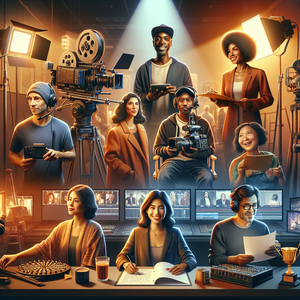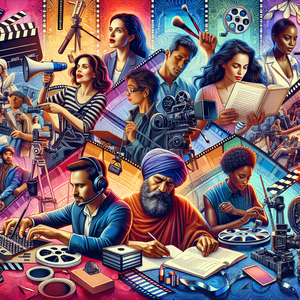
Exploring 15 Stable Careers in the Film Industry: Roles, Requirements, and Opportunities
The film industry is a vibrant and ever-evolving landscape that offers a plethora of career paths for those with diverse talents and passions. While many may envision the glamorous lives of actors and directors, a wealth of essential behind-the-scenes roles is just as crucial for bringing cinematic stories to life. Recent projections indicate a 4% growth in employment opportunities within the film industry over the next decade, signaling a steady demand for skilled professionals. This article delves into 15 vital job titles in the film industry, detailing their responsibilities, qualifications, and how they contribute to the filmmaking process. By emphasizing the stability associated with these careers, we aim to assist aspiring filmmakers in navigating their journey within this exciting realm.
Job Summaries:
Production Designer:
- Production designers are the visionaries behind a film’s visual identity.
- They shape the aesthetic through set design and props.
- They work closely with directors and cinematographers to create a unified visual experience.
- Typically, a degree in fine arts or design is required, along with a strong portfolio.
- This role is fundamental because it directly influences how audiences perceive and emotionally connect with the story.
Sound Designer:
- Sound designers are the auditory architects of film.
- They are responsible for crafting everything from sound effects to dialogue clarity.
- Proficiency in sound editing software and an understanding of acoustics are essential in this role.
- Their contributions enhance storytelling and evoke emotional responses.
- Sound underscores the significant impact of sound on the overall film experience.
Film Editor:
- Film editors play a pivotal role in shaping the final narrative by assembling raw footage.
- They work closely with directors to realize their creative vision.
- Often requiring a bachelor’s degree in film or a related field.
- Editors are crucial in determining pacing and narrative structure.
- Making their expertise invaluable in the filmmaking process.
Assistant Director (AD):
- The assistant director is the linchpin that ensures a smooth production process by managing schedules and facilitating communication between departments.
- Strong organizational skills and prior experience in film production are critical for success in this role.
- An effective AD allows directors to focus on creative aspects, optimizing the filmmaking workflow.
Cinematographer (Director of Photography):
- Cinematographers are responsible for capturing a film's visual essence through mastery of camera work and lighting design.
- They collaborate with directors to curate the film's look and feel.
- Typically requiring a robust background in cinematography or film production.
- Their artistic contributions heavily influence audience perception.
- Highlighting the importance of visual storytelling.
Production Assistant (PA):
- As entry-level positions, production assistants support various on-set departments.
- Gaining invaluable experience and networking opportunities.
- Generally requiring only a high school diploma.
- A passion for the film industry is essential.
- This role often serves as a launching pad for many aspiring filmmakers.
Line Producer:
- Line producers oversee the financial and operational aspects of film production.
- Ensuring adherence to budgets and timelines.
- A solid background in production management and finance is crucial for success in this role.
- Their effectiveness is vital in navigating the complexities of film budgets.
- Making them a backbone of any project.
Screenwriter:
- Screenwriters lay the groundwork for films by crafting compelling scripts, developing characters, dialogue, and plotlines.
- A degree in screenwriting or a related field can be beneficial, along with strong writing skills.
- The screenwriter's ability to create engaging narratives is foundational to a film's success, influencing all phases of production.
Casting Director:
- Casting directors are responsible for selecting the cast.
- Conducting auditions is a key part of their role.
- They collaborate with directors to find the ideal actor for each role.
- Strong interpersonal skills are essential for casting directors.
- A keen eye for talent is necessary.
- Their choices significantly shape character portrayals.
- Casting decisions can greatly affect a film’s reception.
Visual Effects Supervisor:
- Visual effects (VFX) supervisors manage the integration of digital effects into live-action footage.
- A strong background in computer graphics and experience with VFX software are required.
- Their expertise is vital for creating immersive viewing experiences, particularly in genres like fantasy and science fiction.
Costume Designer:
- Costume designers create clothing and accessories that reflect characters’ personalities and the film’s setting.
- Collaborating with production designers and directors.
- They require a deep understanding of fashion history.
- Their work establishes the film's tone and period.
- Making it integral to the storytelling process.
Location Manager:
- Location managers scout and secure filming locations, considering aesthetic appeal and legal requirements.
- Strong organizational skills and project management experience are crucial in this role.
- Their ability to find suitable settings enhances the authenticity and visual appeal of the film.
Gaffer:
- Gaffers are responsible for the lighting on set.
- They work closely with cinematographers to establish mood and atmosphere.
- Technical knowledge and attention to detail are essential.
- Often requires a background in electrical engineering.
- Their contributions significantly influence how the story is visually perceived.
Boom Operator:
- Boom operators capture sound on set using microphones mounted on long poles.
- Good listening skills and knowledge of sound recording techniques are essential.
- Training in sound technology is typically required, making their role crucial for ensuring clear audio, which is vital for effective storytelling.
Marketing Coordinator:
- Marketing coordinators handle promotional activities for films.
- They manage social media campaigns and public relations efforts.
- A degree in marketing or communications is often necessary.
- Their efforts are essential for generating audience interest and engagement prior to a film's release.
These roles illustrate the diverse career opportunities within the film industry, each contributing uniquely to the collaborative process of filmmaking. For those interested in pursuing a career in this dynamic field, numerous job openings and resources are available. Understanding the responsibilities, requirements, and stability of these roles empowers aspiring filmmakers to make informed choices about their career paths. By connecting these insights with real-world examples and personal anecdotes, individuals can find inspiration and guidance in carving their niche in this thrilling industry.
Explore More Jobs

